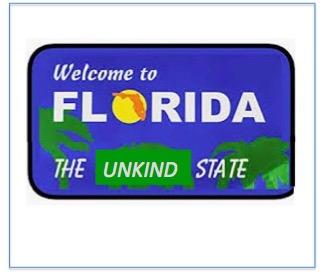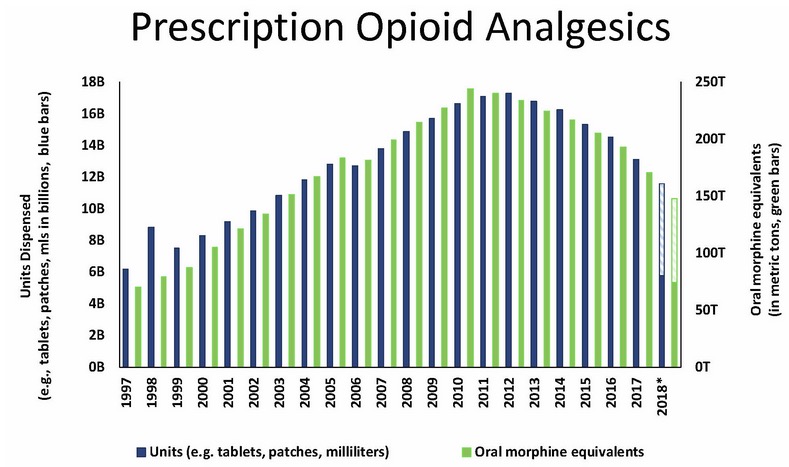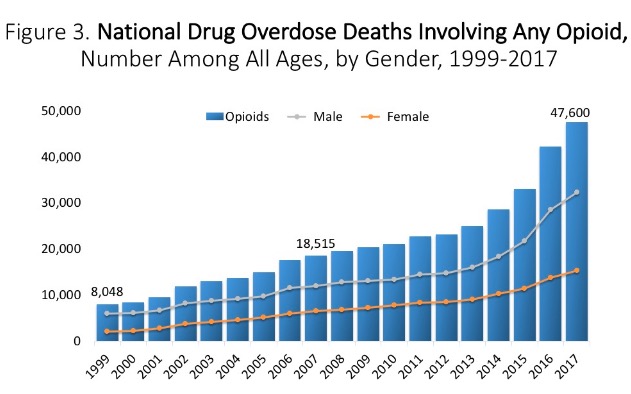
Let's congratulate the state of Florida. In its infinite wisdom, the state has jumped into the scrum of the "who can be tougher on drugs" match that is playing out all across America at the expense of pain patients, past, present, and future (1).
Could there be a better way to celebrate than by taking apart another crap study? Didn't think so.
This one is called "Opioid prescriptions for acute pain after outpatient surgery at a large public university-affiliated hospital: Impact of state legislation in Florida" and was published online last month by a group of surgeons at the University of Miami Medical School. It's a real beaut. Let's take it apart...
"In response to the growing opioid crisis, Florida recently implemented a law restricting the duration of opioid prescriptions for acute pain."
Aside from the fact that opioid use by pain patients (especially short-term) played approximately zero part in the fentanyl epidemic, this statement is fundamentally sound.
"Little is known about the impact of such legislation on opioid prescription practices at the time of discharge after surgery."
Well, that's not really true, is it? Plenty is known. Like this...

The number of opioid prescriptions by year (source: CDC) Between 2012-2017 there was a ~30% reduction in opioid prescriptions while during that same time period...

...deaths from any opioid more than doubled. Nice going.
"The objective of this study was to determine whether Florida’s new legislation changed opioid prescription practices for analgesia after surgery."
Let me get this straight. This is a study to determine whether fewer post-surgical opioid prescriptions were written after a law was passed limiting opioid prescriptions? Duh?
"The proportion of patients receiving opioid prescriptions for longer than a 3-day supply decreased by 68% [after the law passed]."
How can we explain this marked decrease? Here is a section from Florida's new law, HB 21 Section 456.44 – Controlled Substance Prescribing:
"HB 21 provides that a prescription for a Schedule II opioid for the treatment of acute pain may not exceed a three-day supply." (2)
Not only does a law that prohibits prescriptions for more than three days decrease the number of prescriptions for more than three days, but it does so by 68%!
Everything I've discussed about the U Miami study so far has been merely stupid. But then it gets irresponsible...
"We observed no change in the number of postoperative emergency department visits before and after implementation of the law."
This statement is one gigantic problem (3). Taken at face value it tells us that everything is fine and dandy – that strict restriction of post-operative opioid scripts has no adverse impact on patients, something that will no doubt be reported by the press. But here's what it doesn't address:
- Was there an assessment of post-operative pain?
- Were patients comfortable when the drugs ran out?
- Or did the law merely result in patient suffering?
- Did the law result in an increase in time of recuperation or in secondary complications?
- Is the number of emergency department visits an accurate proxy of patient pain? It is now common knowledge that you are just about as likely get opioids in an emergency department as at a Dairy Queen.
- Was there an increased use of NSAIDs after day 3?
- If so, was there an increase in adverse events due to the NSAIDs?
- Were there additional emergency room visits or hospital admissions for acetaminophen (Tylenol) poisoning?
- When, exactly, did it become acceptable for governments to tell doctors how to do their jobs?
"The legislation should significantly decrease the amount of unused opioid pills potentially available for diversion and abuse."
...and significantly increase the number of deaths from street fentanyl, as the two graphs above clearly demonstrate.
"Secondary effects from the enactment of this law remain to be evaluated."
Don't hold your breath. This study will never be done, and the off-chance it is, it will never see the light of day if the results support anything other than the party line. Do you honestly think that any ideologically-driven academician or opportunistic politician is going to admit that there any downside to a law imposing mandatory limits on anything opioid-related?
No way.
“Whenever you find yourself on the side of the majority, it is time to pause and reflect.”
Mark Twain
Or, if you don't like Twain, try Orwell...
"If you want a vision of the future, imagine a boot stamping on a human face - forever."
George Orwell
NOTES:
(1) It is only a matter of time until any of us, our families, or our friends are going to require pain medication and be denied what they need. Given today's climate of bullying and hysteria, this is inevitable. We are all one illness or accident from being in the same sinking ship that is already overloaded with millions of Americans. One can only hope that the Florida Legislature suffers a massive, collective kidney stone first. And let's save one for Governor Rick Scott, who signed this atrocity into law in early 2018.
(2) HB 21 provides exceptions where a seven-day supply is permitted but only if certain conditions are met. And these conditions are determined by the prescribing physicians, who are themselves under pressure to stop prescribing. Fox. Henhouse.
(3) Thanks to former ACSH advisor Dr. Jack Fisher, a retired surgeon, for bringing this to our attention.



